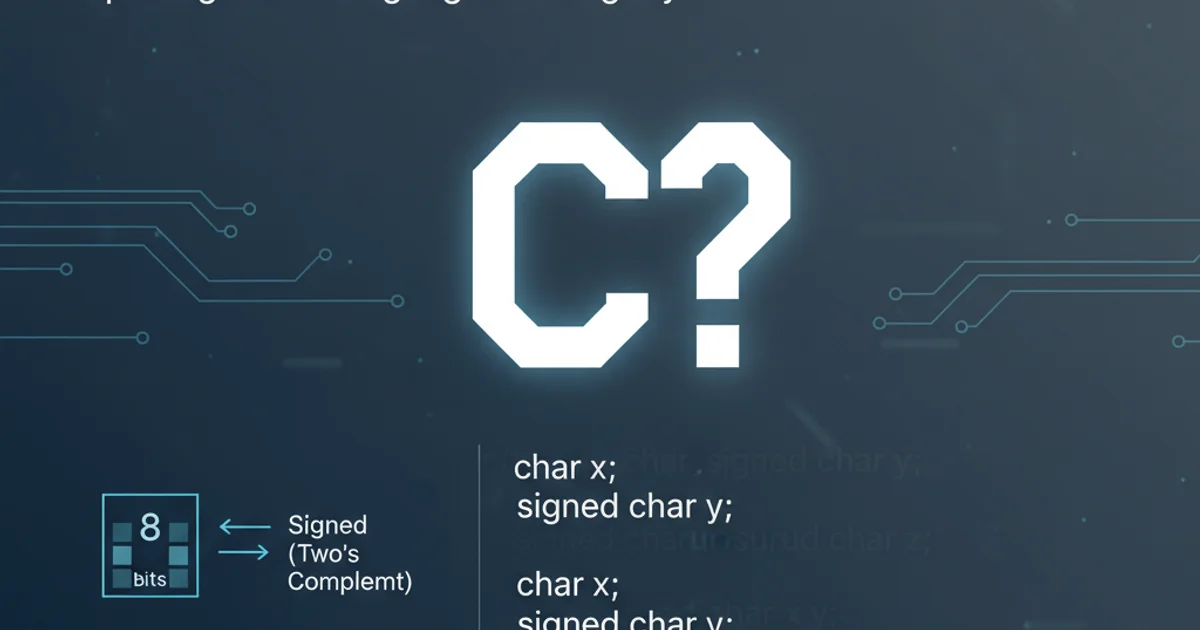Is char signed or unsigned by default?
Categories:
Is char Signed or Unsigned by Default in C?

Explore the nuances of the char type in C, its signedness default, and how compiler and architecture choices impact its behavior across different systems.
The char data type in C is fundamental for storing character values, but its default signedness is a common point of confusion for developers. Unlike int or long, which are explicitly signed by default, the char type's signedness is implementation-defined. This means that whether a plain char behaves as signed char or unsigned char can vary depending on the compiler, the target architecture, and the specific platform.
Understanding char, signed char, and unsigned char
In C, there are three distinct character types: char, signed char, and unsigned char. While signed char is guaranteed to hold values from at least -127 to +127, and unsigned char from 0 to 255 (assuming an 8-bit byte), the range of a plain char is either the same as signed char or unsigned char. This distinction is crucial when performing arithmetic operations or when char values are implicitly converted to larger integer types, as it affects how the most significant bit is interpreted.
flowchart TD
A[Plain `char` Declaration] --> B{Compiler/Platform Default?}
B -->|Yes, `signed char`| C[Range: -128 to 127]
B -->|Yes, `unsigned char`| D[Range: 0 to 255]
C --> E[Sign Extension on Conversion]
D --> F[Zero Extension on Conversion]
E & F --> G[Potential for Unexpected Behavior]
G --> H[Best Practice: Explicitly Specify Signedness]Decision flow for char signedness and its implications.
Implementation-Defined Behavior and Its Impact
The C standard explicitly states that char has the same range, representation, and alignment requirements as either signed char or unsigned char, but which one is implementation-defined. This design choice allows compilers to optimize for the native character handling of the underlying hardware. For instance, some architectures might handle signed values more efficiently, while others might prefer unsigned. This variability can lead to portability issues if code relies on a specific char signedness without explicitly declaring it.
#include <stdio.h>
#include <limits.h>
int main() {
char c = 200; // Value outside signed char range if char is signed
printf("Size of char: %zu bytes\n", sizeof(char));
printf("CHAR_MIN: %d\n", CHAR_MIN);
printf("CHAR_MAX: %d\n", CHAR_MAX);
if (c < 0) {
printf("Plain char is signed by default. Value: %d\n", c);
} else {
printf("Plain char is unsigned by default. Value: %d\n", c);
}
// Demonstrating explicit types
signed char sc = 200; // Will wrap around or be implementation-defined if 200 > SCHAR_MAX
unsigned char uc = 200;
printf("Signed char value: %d\n", sc);
printf("Unsigned char value: %d\n", uc);
return 0;
}
C code demonstrating char signedness and its potential for unexpected values.
char can introduce subtle bugs, especially when porting code between different systems or when performing arithmetic operations that involve values near the type's boundaries. Always explicitly use signed char or unsigned char when signedness matters.Best Practices for Portability and Clarity
To write robust and portable C code, it's essential to avoid assumptions about the default signedness of char. When dealing with raw byte data, such as reading from a file or network stream, unsigned char is almost always the correct choice to ensure that all 256 possible byte values are handled without sign extension issues. When working with character data that might involve negative values (though less common for typical text), or when char is used as a small integer type, explicitly using signed char or unsigned char removes ambiguity.
#include <stdio.h>
void process_byte(unsigned char byte_value) {
printf("Processing unsigned byte: %u\n", byte_value);
}
void process_signed_char(signed char s_char_value) {
printf("Processing signed char: %d\n", s_char_value);
}
int main() {
char data_byte = 0xFF; // Represents 255 if unsigned, or -1 if signed
// Explicitly cast to avoid ambiguity when passing to functions
process_byte((unsigned char)data_byte);
process_signed_char((signed char)data_byte);
return 0;
}
Using explicit casts and type declarations for clarity and safety.
char is generally sufficient as long as you're not performing arithmetic operations that depend on its signedness. However, for byte-level data manipulation or when char is used as a small integer, always specify signed char or unsigned char.